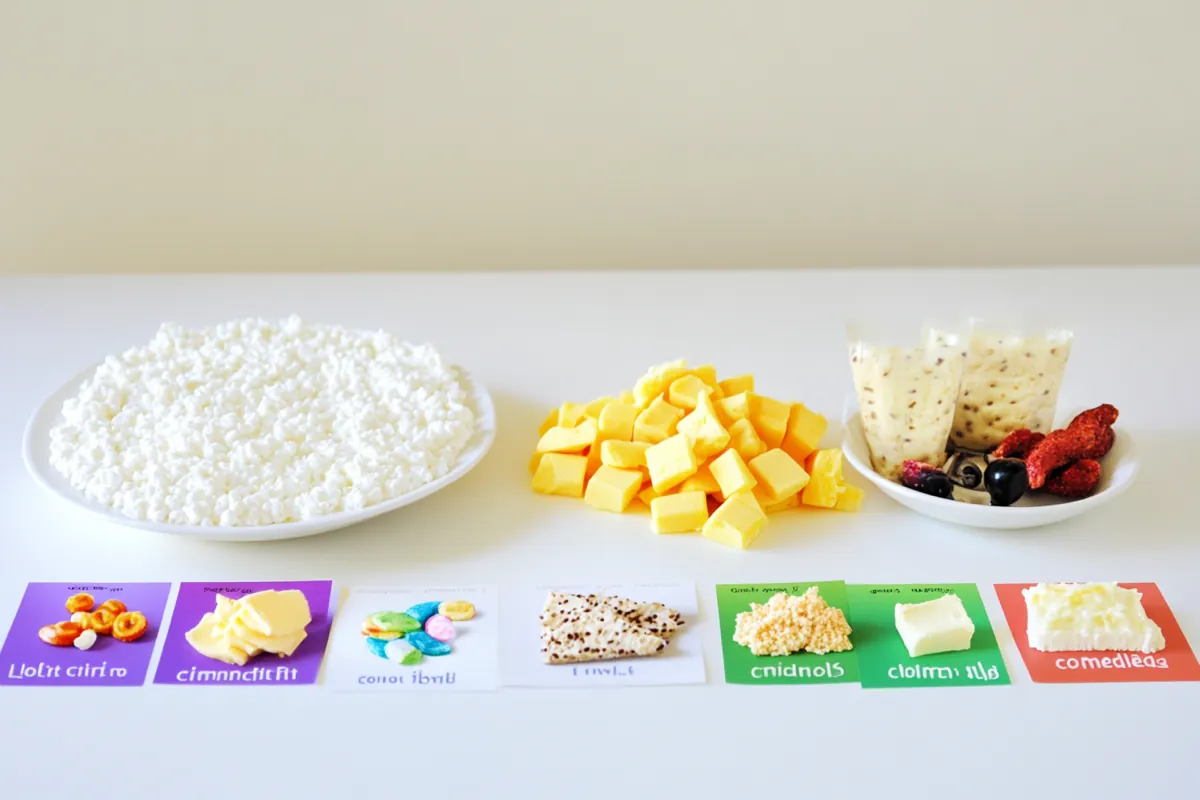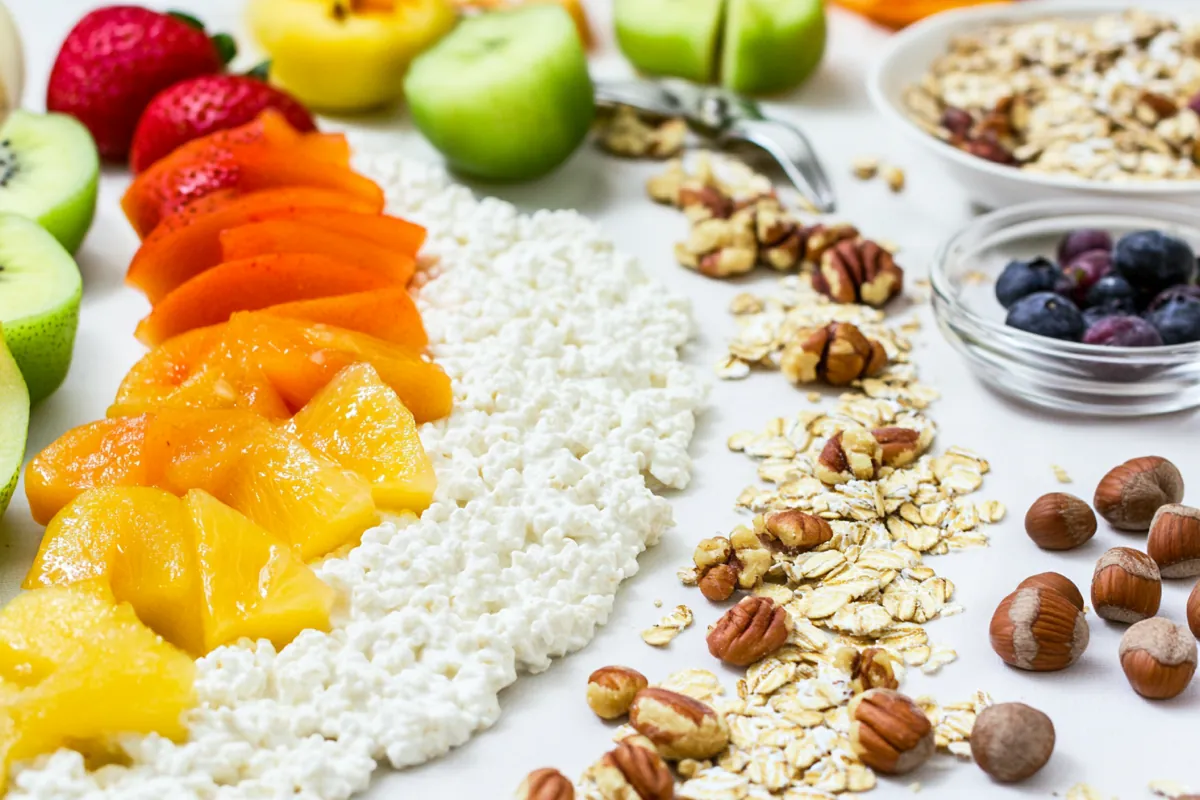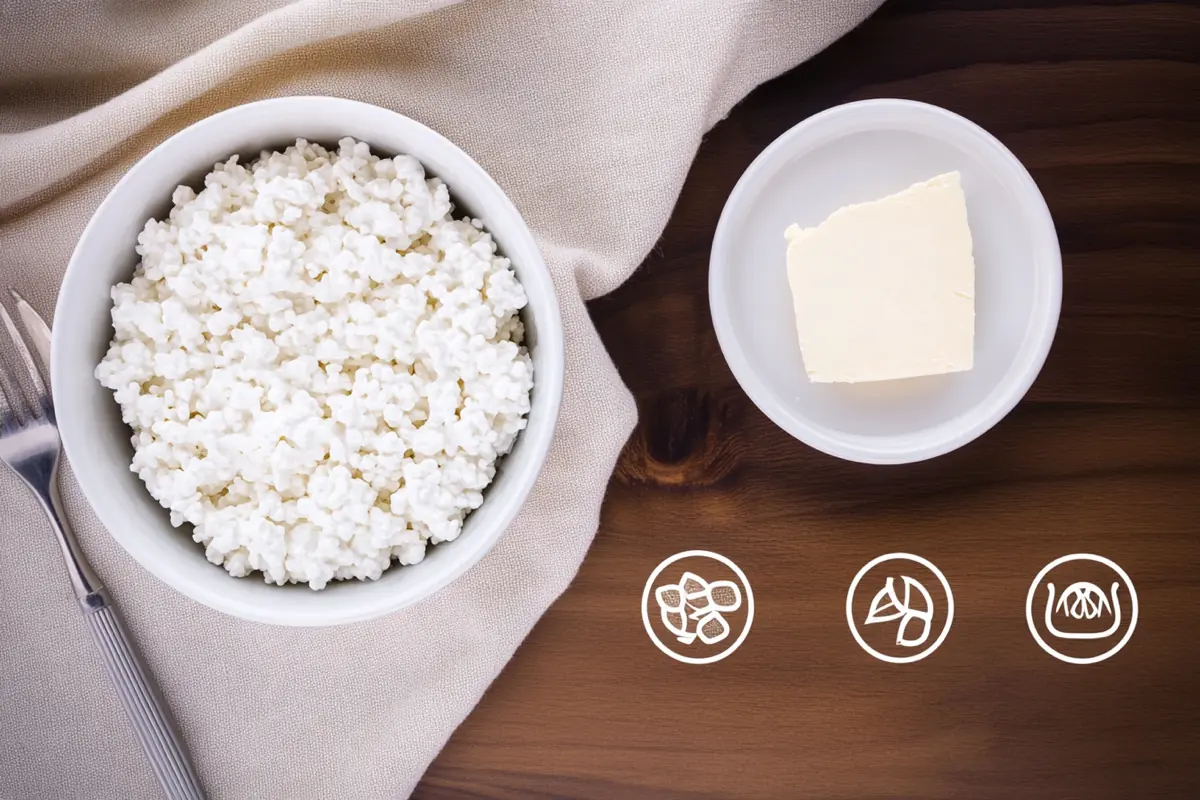Low fat cottage cheese has gained popularity as a go-to dairy option for those seeking a healthier lifestyle. With its creamy texture and mild flavor, it’s an excellent addition to various meals. This article will explore everything you need to know about low fat cottage cheese, including its nutritional benefits, protein content, and how it compares to other dairy products.
Table of Contents
What is Low Fat Cottage Cheese?
Cottage cheese is a fresh cheese made from curds that have been drained of their whey. The term “low fat” indicates that this variety contains less fat than its full-fat counterparts. This makes it a popular choice for individuals looking to reduce their fat intake without sacrificing taste.
History and Origins of Cottage Cheese
Cottage cheese has a rich history that dates back centuries. Originating in Europe, it was initially made by accident when milk was left to sour. The curds formed naturally, and people soon discovered the delicious taste and health benefits. Over time, various cultures adapted the recipe, leading to the cottage cheese varieties we enjoy today.
Differences Between Low Fat and Full Fat Cottage Cheese
The main difference between low fat and full fat cottage cheese lies in their fat content. Low fat cottage cheese typically contains 1% to 2% milk fat, while full fat varieties contain about 4% to 5% milk fat. This reduction in fat makes low fat cottage cheese a lighter option, making it an ideal choice for those looking to manage their weight. Additionally, lower fat content means fewer calories, making this cheese an excellent addition to a balanced diet.
A Nutritional Breakdown
Low fat cottage cheese is not only low in fat but also high in essential nutrients, making it a smart choice for health-conscious individuals.
Key Nutrients
One of the standout features of low fat cottage cheese is its impressive nutritional profile. It contains a variety of vitamins and minerals that contribute to overall health. Typically, a 1-cup serving of low fat cottage cheese provides:
- Calories: Approximately 90-120
- Protein: About 25 grams
- Fat: Between 1-2 grams
- Carbohydrates: Around 6 grams
- Calcium: 15% of the daily value
- Phosphorus: 20% of the daily value
These nutrients make low fat cottage cheese a fantastic option for those looking to build muscle, support bone health, and maintain a healthy weight.
Vitamins and Minerals in Low Fat Cottage Cheese
Low fat cottage cheese is rich in essential vitamins like B12 and riboflavin, which play crucial roles in energy production and red blood cell formation. Additionally, it contains minerals like calcium and phosphorus, vital for maintaining strong bones and teeth. Including this dairy product in your diet can help ensure you meet your daily nutrient needs.
Comparing Low Fat Cottage Cheese to Other Dairy Products
When comparing low fat cottage cheese to other dairy products, it stands out for its high protein content and lower fat levels. For instance, Greek yogurt is another popular high-protein option, but it often has more sugar and calories. Conversely, low fat cottage cheese provides a satisfying taste with fewer calories, making it an excellent choice for snacking or meal prep.
An Excellent Source of Protein
One of the main reasons people choose low fat cottage cheese is its high protein content. This dairy product is packed with protein, making it an ideal option for those looking to build muscle or lose weight.
Protein Content and Benefits
A 1-cup serving of low fat cottage cheese can provide approximately 25 grams of protein. This makes it one of the highest protein dairy options available. Protein is essential for muscle repair and growth, making it a fantastic post-workout snack.
How Low Fat Cottage Cheese Supports Muscle Growth
Eating low fat cottage cheese after a workout can help replenish your muscles. The protein in cottage cheese is a complete protein, meaning it contains all nine essential amino acids your body needs. This makes it an excellent choice for athletes and fitness enthusiasts looking to optimize recovery and muscle growth.
Low Fat Cottage Cheese in a Balanced Diet
Incorporating it into your meals can enhance your overall diet. You can enjoy it in various ways, such as mixing it with fruits, adding it to smoothies, or using it as a topping for whole-grain toast. Its versatility makes it an excellent addition to both savory and sweet dishes. It is a great source of protein and calcium, which support muscle health and bone strength. Additionally, it is low in calories, making it an ideal choice for weight management. Whether used as a snack, a breakfast option, or a component of a main dish, it can easily fit into a balanced diet while providing essential nutrients.

Understanding Caloric Content
Understanding the caloric content of low fat cottage cheese is essential for those monitoring their diet. This cheese offers a satisfying option without the high calorie counts found in many other snacks.
Caloric Comparison: Low Fat Cottage Cheese vs. Other Snacks
When comparing it to other popular snacks, it becomes evident how beneficial it can be for those looking to maintain a healthy weight. For instance:
- 1 cup of low fat cottage cheese: Approximately 90-120 calories
- 1 cup of full fat cottage cheese: Around 220-240 calories
- 1 serving of potato chips: About 150-300 calories
- 1 granola bar: Approximately 100-200 calories
As you can see, low fat cottage cheese provides a lower calorie alternative while still delivering high protein, making it a smart choice for snacking.
How Portion Size Affects Caloric Intake
Portion size plays a crucial role in managing caloric intake. Low fat cottage cheese can be enjoyed in various serving sizes, allowing for flexibility. For instance, a small half-cup serving contains about 45-60 calories. This means you can customize your snacking without the guilt of overindulging. Keeping portion sizes in check helps promote a balanced diet and supports weight management.
Health Benefits
Low fat cottage cheese offers numerous health benefits that make it a valuable addition to your diet. From aiding in weight management to promoting digestive health, this dairy product shines in various aspects.
Weight Management
Many individuals turn to low fat cottage cheese as part of their weight loss journey. Due to its high protein and low calorie content, it helps keep you feeling full longer. This can reduce the likelihood of snacking on high-calorie foods, making it easier to stick to your dietary goals.
Weight Loss
Including low fat cottage cheese in your meals can support weight loss in several ways:
- High Protein Content: Protein increases feelings of fullness.
- Low Calorie: Fewer calories mean less energy intake overall.
- Versatile Ingredient: This cheese can be used in various recipes, from savory to sweet, making healthy eating more enjoyable.
Benefits for Digestive Health
Low fat cottage cheese is also beneficial for digestive health. It contains probiotics, which are beneficial bacteria that support gut health.
The Role of Probiotics
Probiotics help maintain a healthy balance of gut bacteria, which is essential for digestion and overall health. Regular consumption of low fat cottage cheese may promote better digestion and enhance nutrient absorption. Including this dairy option in your daily routine can contribute to a healthier digestive system.
How to Incorporate Low Fat Cottage Cheese into Your Diet
Finding ways to include low fat cottage cheese in your diet can be fun and delicious. Its versatility allows it to fit seamlessly into various meals and snacks.
Delicious Recipes
There are countless ways to enjoy it. Here are a few ideas to inspire you:
- Cottage Cheese Pancakes: Mix cottage cheese with oats and eggs for a protein-packed breakfast.
- Savory Cottage Cheese Bowl: Combine cottage cheese with diced veggies, herbs, and spices for a nutritious snack.
- Fruit Parfait: Layer low fat cottage cheese with fresh fruits and a drizzle of honey for a delightful dessert.
Breakfast Ideas
Low fat cottage cheese can make your breakfast more satisfying. Try these simple ideas:
- Cottage Cheese with Berries: Top your bowl with fresh berries and a sprinkle of cinnamon.
- Smoothie Booster: Add a scoop of cottage cheese to your morning smoothie for extra creaminess and protein.
- Toast Topping: Spread cottage cheese on whole-grain toast and top with sliced avocado and cherry tomatoes.
By incorporating it into your meals, you can enhance flavor and nutrition without adding excessive calories.

A Perfect Pair with Fitness
For fitness enthusiasts, it is more than just a snack; it’s a powerful tool for muscle recovery and overall health. Its high protein content makes it an ideal post-workout option.
Pre and Post Workout Snacks
Incorporating low fat cottage cheese into your pre and post-workout routines can enhance your performance and recovery. A serving of low fat cottage cheese can provide the energy and nutrients needed for intense workouts.
Enhancing Your Workout Performance
Eating low fat cottage cheese before a workout can fuel your body. The protein helps maintain energy levels, while the carbohydrates from any added fruits provide quick energy. This combination ensures that you have the stamina to push through your exercise routine.
In addition, consuming cottage cheese after a workout can aid muscle recovery. The amino acids from protein help repair muscle fibers, allowing for quicker recovery and less soreness.
Versatile Uses Beyond Snacking
Low fat cottage cheese isn’t just a great snack; it can be used in various culinary applications. Its creamy texture makes it a versatile ingredient in many dishes.
Creative Cooking
You can add low fat cottage cheese to a range of recipes, both sweet and savory. Here are some creative ways to incorporate it into your meals:
- Cottage Cheese Mac and Cheese: Mix cottage cheese with pasta and a sprinkle of cheese for a healthier mac and cheese option.
- Cottage Cheese Smoothies: Blend cottage cheese with fruits and spinach for a nutritious smoothie packed with protein.
- Savory Dips: Combine cottage cheese with herbs and spices to create a delicious dip for veggies.
Smoothies and Sauces
Smoothies and sauces are excellent ways to use low fat cottage cheese. The cheese adds creaminess without the extra calories. For instance, a smoothie with low fat cottage cheese, banana, and almond milk can provide a satisfying breakfast or snack.
You can also blend cottage cheese into sauces. It can create a creamy texture for pasta sauces or dressings while boosting the protein content. This makes your meals not only more filling but also more nutritious.
Myths and Misconceptions
Despite the numerous benefits of low fat cottage cheese, several myths surround this dairy product. Understanding these myths is essential for making informed dietary choices.
Debunking Myths About Low Fat Cottage Cheese
One common myth is that it lacks flavor. In reality, its mild taste makes it an adaptable ingredient in many dishes. You can easily enhance its flavor by adding herbs, spices, or fresh fruits.
Another misconception is that it is not nutritious. However, it is rich in protein, calcium, and other essential nutrients, making it a valuable addition to any diet.
Is Low Fat Cottage Cheese High in Sugar?
Some people worry that low fat cottage cheese contains a lot of sugar. In general, it has low sugar content, especially when compared to flavored yogurts or other dairy snacks. Always check the label for added sugars, but unflavored varieties are typically low in sugar.
The Future of Low Fat Cottage Cheese in Nutrition
As dietary trends evolve, low fat cottage cheese continues to hold its place in a health-conscious diet. With growing interest in high-protein, low-calorie foods, this dairy option remains a favorite among nutritionists and health enthusiasts alike.
Trends in Low Fat Dairy Products
Low fat dairy products are increasingly popular as people become more aware of their health. Low fat cottage cheese fits perfectly into this trend. It meets the demand for nutritious, low-calorie options that do not compromise taste or quality.
Innovations in Cottage Cheese Production
The cottage cheese market is also witnessing innovations. Manufacturers are experimenting with new flavors and formulations to attract consumers. For example, they are infusing cottage cheese with probiotics for added health benefits or creating flavored varieties without added sugars. These innovations make low fat cottage cheese more appealing to a broader audience.

Conclusion
Incorporating low fat cottage cheese into your diet offers numerous health benefits. It is a versatile, nutritious option that can support weight management, muscle recovery, and overall health.
Summary of Benefits
To summarize, low fat cottage cheese is:
- High in Protein: Aids in muscle repair and growth.
- Low in Calories: Helps with weight management.
- Rich in Nutrients: Provides essential vitamins and minerals.
- Versatile: Perfect for various recipes and meal types.
Encouragement to Include in Your Diet
With its many advantages, low fat cottage cheese deserves a place in your pantry. Whether you enjoy it as a snack, in recipes, or as part of your post-workout routine, this dairy product can help you achieve your health and fitness goals. Try incorporating it into your meals today and experience the benefits for yourself!
FAQ
As a popular dairy product, many people have questions about low fat cottage cheese. Here are some of the most common inquiries:
Is Low Fat Cottage Cheese Healthy?
Yes, it is a healthy option. It is low in calories, high in protein, and contains essential nutrients. Including it in your diet can support weight management and muscle recovery.
Which Kind of Cottage Cheese is Healthiest?
Low fat cottage cheese is generally considered the healthiest option due to its lower fat content and high protein levels. However, choosing varieties without added sugars or preservatives is essential for maximizing health benefits.
How Do You Eat Cottage Cheese for Weight Loss?
To eat cottage cheese for weight loss, consider using it as a snack or meal component. Pair it with fruits, nuts, or vegetables for added flavor and nutrition. Its high protein content helps keep you full, reducing the temptation to snack on less healthy options.
Is Low Fat Cottage Cheese High in Sugar?
No, it is not high in sugar. It typically contains minimal natural sugars from lactose. However, always check the nutrition label for added sugars in flavored varieties.
By understanding the benefits, you can make informed choices that support your health and fitness goals.




